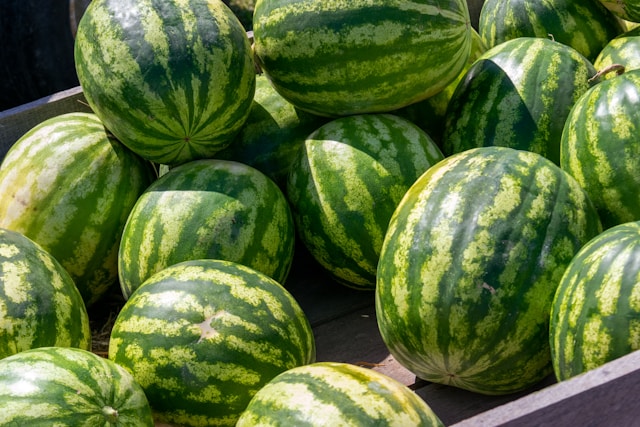What exactly is watermelon farming? Is watermelon farming a profitable business? Does watermelon farming add to the overall health?
Watermelon farming involves cultivating watermelon plants to produce the juicy, refreshing fruit that’s enjoyed worldwide. But is it a lucrative venture? And does consuming watermelon offer health benefits? Let’s delve into these questions.
To begin with watermelon farming, you need ample space for planting. Watermelon plants tend to sprawl as they grow, so a spacious planting site is essential. These plants are also heavy feeders, meaning they require nutrient-rich soil or supplemental fertilization. Additionally, understanding the optimal growing season in your region is crucial for successful cultivation.
Preparing raised beds or mounds of soil is common practice for planting watermelon seeds. These mounds help with water drainage and soil warmth, both beneficial for watermelon cultivation. Planting seeds about an inch deep in mounds spaced 6-12 inches apart is typical. Regular fertilization and mulching aid in providing essential nutrients, moisture retention, and weed control throughout the growing season.
Watermelon plants are similarly substantial feeders, which means you might want to get prepared fertilizer at the event you don’t have nutritional rich soil. You also need to understand how long to develop your own watermelons for, and you’ll have to design around your country’s growing season.
The duration from seed planting to fruit harvest varies depending on the watermelon variety and environmental conditions. Generally, it takes around 11-12 weeks for watermelons to mature, with smaller varieties having shorter growing periods.
Watermelons come in various types, including:
Traditional Watermelon: These are the typical spherical or rectangular watermelons, ranging from 15 to 45 pounds, with large black seeds.
Seedless Watermelon: These hybrids are popular for their lack of seeds and typically weigh around 15 pounds. They may contain small, edible white seeds. Seedless watermelons frequently have little and easily match for human ingestion white seeds.
Some kinds of watermelon which fall into this course include: Red Bijou, Jack of Hearts, King of Hearts, Millionaire, Nova, Queen of Hearts, Trio A Mini Watermelon – The smaller kind of watermelons which has a lanky rind.
Mini Watermelon: These are smaller varieties with thinner rinds, such as the Sugar Baby and Tiger Baby types.
You also have to get prepared mountains of dirt to plant the seeds as they will deplete water faster than dirt on flat ground. These hills of dirt also will generally be warmer, which is ideal for tropical all-natural product such as watermelon. A smidgen of corrected manure weekly may similarly be helpful for your plants as watermelons require a fantastic deal of nutritional supplements from the fertilizer and dirt.
Despite being composed mainly of water (about 92%), watermelons are packed with nutrients. They are rich in vitamins A, B6, and C, as well as lycopene, antioxidants, and amino acids. Additionally, watermelons are low in calories, fat-free, and sodium-free, making them a healthy snack option.
It is likewise a wise notion to add mulch into the dirt because it helps with holding dampness and going out weeds which could meddle with the maturation of your own plants.
Additionally, it’s very important to note that the time period of its development is determined by the cultivar used along with also the fruit can be grown throughout the year.
Used to describe a very simple watermelon this is rectangular or spherical and weighs one of 15 to forty five pounds. These watermelons consist of significant black seeds.
Watermelon types comprising the Sugar Baby along with the Tiger Baby collapse below this class. Some watermelon types that drop below this category include: Desert King. Watermelons are for the most part water around 92 percent — nevertheless this reviving natural product is doused with nutritional supplements.
Watermelon Farming: Health Benefits
Lycopene, a potent antioxidant found in high levels in watermelons, has been associated with various health benefits, including heart health, bone health, and cancer prevention. The ripening process of watermelons increases their beta-carotene and phenolic antioxidant content, further enhancing their health-promoting properties. Each delicious nibble has remarkable degrees of nourishment A, B6, C, mobile reinforcements, and amino acids. There is a modest step of potassium.
Watermelon consumption has been linked to reduced blood pressure, improved arterial function, and decreased risk of heart disease, especially in older individuals. The presence of arginine in watermelons also contributes to improved blood flow and fat metabolism.
Moreover, watermelons aid in hydration, digestion, and skin health due to their high water content, fiber, vitamins, and electrolytes.
Additionally, this quintessential summer nibble is sans fat, exceptionally low in sodium and contains only 40 calories for each and every cup.
“Nourishments high in cancer prevention representatives and amino acids allow your body to operate ideallyMobile reinforcements help forestall injury, and cancerous growth. Amino acids are the basic structure block for proteinprotein is used in for many intents and purposes each vital capacity within the entire body.”
Scientists have paid heed to watermelon’s high lycopene levels — approximately 15 to 20 mg for every 2-cup serving, in accordance with the National Watermelon Promotion Board — possibly the most elevated levels of a brand new produce.
Lycopene is a phytonutrient, which can be a generally occurring compound in foods developed in the earth that reacts with the body to activate sound reactions. It’s also the reddish shade that provides watermelons, tomatoes, red grapefruits and guavas their shading.
Lycopene has been correlated with heart health, bone health and prostate cancer yeast growth counteraction. It is also a ground-breaking mobile reinforcement Considered to have soothing properties.
To genuinely amplify your lycopene entrance, allow your watermelon age. Beta-carotene and phenolic cancer prevention representative content similarly increment since the watermelon matures. “Beta carotene is a cancer prevention agent located in red-orange foods developed in the floor.
It helps with invulnerability skin, eye and also the anticipation of disorder Watermelon’s excessive levels of lycopene are extremely effective at defensive cells in harm and may assist reduce the threat of coronary heart disease, consistent with a have a look at at Purdue University.
The American Journal of Hypertension found that watermelon extracts helped reduce elevated blood pressure and lessen blood pressure in obese adults.Watermelon can be especially crucial for elderly girls.
It had been found that postmenopausal women, a group considered to possess prolonged aortic stiffness, that obtained watermelon extract for 2 months detected reduced blood pressure and arterial stiffness when compared with individuals who did no more take watermelon infusion.
Arginine can help improve blood flow and may assist decrease the buildup of additional fat.”The lycopene in watermelon causes it to be an anti inflammatory beverage,” Jarzabkowski said. Lycopene is a inhibitor for varied inflammatory techniques and also works as an antioxidant to neutralize radicals that are loose.
Read More Info: Palm Kernel Analysis
Watermelon Farming: Skin Care Benefits
Reducing irritation is not just desirable for human beings laid low with gout. This manner, anti inflammatory food can aid with frequent immunity and significant health.
HYDRATION: “Watermelons help with regular hydration, which could possibly be an unbelievable thing,” said Lemond. “They say we are capable of getting 20-30% of our liquid needs thruo our daily diet alone, and meals such as those actually help. Furthermore, their juice is full of desired electrolytes. This may even help save warmness stroke.
DIGESTION: The watermelon includes fiber, which arouses a healthy digestive tract and empowers hold you routine. Vitamin A is leading on your skin and pores, and just a cup of watermelon is composed of nearly one-zone of your recommended daily ingestion of it.
Vitamin A allows hold skin and pores and hair moisturized, and additionally, it encourages wholesome flourish of collagen and elastin tissues, in accordance with the Cleveland Clinic. Vitamin C is also helpful on this aspect, since it promotes healthy hydration boom.
Furthermore, watermelon farming offers additional benefits beyond profitability and health.
Watermelon cultivation promotes environmental sustainability by utilizing natural resources efficiently. The plant’s deep root system helps prevent soil erosion and improves soil structure, enhancing overall soil health. Additionally, watermelon vines provide ground cover, reducing weed growth and conserving soil moisture.
Moreover, watermelon farming supports local economies by providing employment opportunities, particularly in rural areas where agriculture is a primary source of income. The cultivation, harvesting, and distribution of watermelons create jobs across various sectors, contributing to economic growth and community development.
In terms of global food security, watermelon farming plays a role in diversifying agricultural production and providing nutritious food sources. With proper cultivation practices and technological advancements, watermelon yields can be optimized to meet the demands of a growing population.

